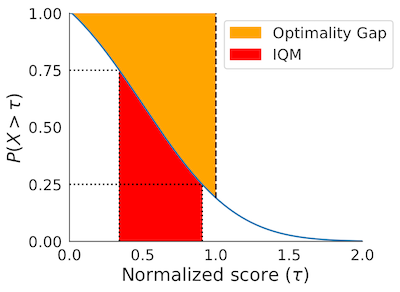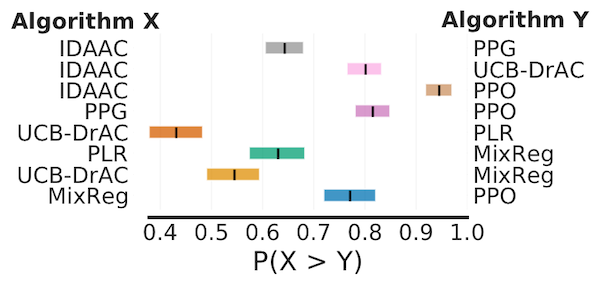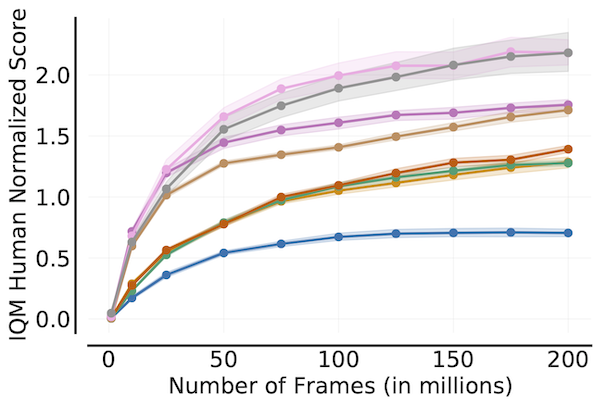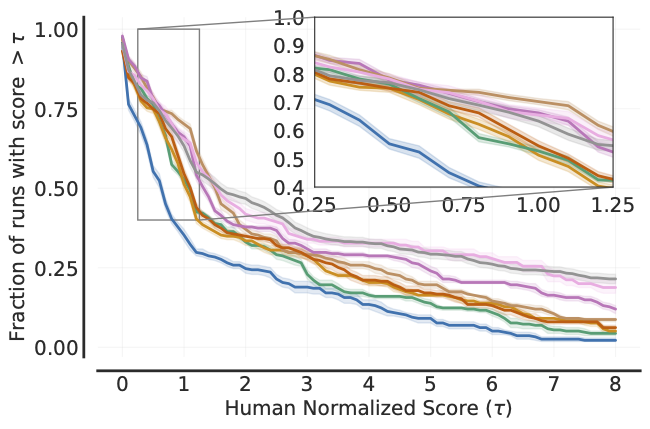
Product
Introducing Scala and Kotlin Support in Socket
Socket now supports Scala and Kotlin, bringing AI-powered threat detection to JVM projects with easy manifest generation and fast, accurate scans.
rliable: Reliable evaluation on reinforcement learning and machine learning benchmarks.


rliable is an open-source Python library for reliable evaluation, even with a handful
of runs, on reinforcement learning and machine learnings benchmarks.
| Desideratum | Current evaluation approach | Our Recommendation |
|---|---|---|
| Uncertainty in aggregate performance | Point estimates:
| Interval estimates using stratified bootstrap confidence intervals (CIs) |
| Performance variability across tasks and runs | Tables with task mean scores:
| Score distributions (performance profiles):
|
| Aggregate metrics for summarizing benchmark performance | Mean:
| Interquartile Mean (IQM) across all runs:
|
rliable provides support for:

We provide a colab at bit.ly/statistical_precipice_colab, which shows how to use the library with examples of published algorithms on widely used benchmarks including Atari 100k, ALE, DM Control and Procgen.
You can access the data for individual runs using the public GCP bucket here (you might need to sign in with your gmail account to use Gcloud) : https://console.cloud.google.com/storage/browser/rl-benchmark-data. The interactive colab above also allows you to access the data programatically.
For more details, refer to the accompanying NeurIPS 2021 paper (Outstanding Paper Award): Deep Reinforcement Learning at the Edge of the Statistical Precipice.
To install rliable, run:
pip install -U rliable
To install latest version of rliable as a package, run:
pip install git+https://github.com/google-research/rliable
To import rliable, we suggest:
from rliable import library as rly
from rliable import metrics
from rliable import plot_utils
algorithms = ['DQN (Nature)', 'DQN (Adam)', 'C51', 'REM', 'Rainbow',
'IQN', 'M-IQN', 'DreamerV2']
# Load ALE scores as a dictionary mapping algorithms to their human normalized
# score matrices, each of which is of size `(num_runs x num_games)`.
atari_200m_normalized_score_dict = ...
aggregate_func = lambda x: np.array([
metrics.aggregate_median(x),
metrics.aggregate_iqm(x),
metrics.aggregate_mean(x),
metrics.aggregate_optimality_gap(x)])
aggregate_scores, aggregate_score_cis = rly.get_interval_estimates(
atari_200m_normalized_score_dict, aggregate_func, reps=50000)
fig, axes = plot_utils.plot_interval_estimates(
aggregate_scores, aggregate_score_cis,
metric_names=['Median', 'IQM', 'Mean', 'Optimality Gap'],
algorithms=algorithms, xlabel='Human Normalized Score')

# Load ProcGen scores as a dictionary containing pairs of normalized score
# matrices for pairs of algorithms we want to compare
procgen_algorithm_pairs = {.. , 'x,y': (score_x, score_y), ..}
average_probabilities, average_prob_cis = rly.get_interval_estimates(
procgen_algorithm_pairs, metrics.probability_of_improvement, reps=2000)
plot_utils.plot_probability_of_improvement(average_probabilities, average_prob_cis)

algorithms = ['DQN (Nature)', 'DQN (Adam)', 'C51', 'REM', 'Rainbow',
'IQN', 'M-IQN', 'DreamerV2']
# Load ALE scores as a dictionary mapping algorithms to their human normalized
# score matrices across all 200 million frames, each of which is of size
# `(num_runs x num_games x 200)` where scores are recorded every million frame.
ale_all_frames_scores_dict = ...
frames = np.array([1, 10, 25, 50, 75, 100, 125, 150, 175, 200]) - 1
ale_frames_scores_dict = {algorithm: score[:, :, frames] for algorithm, score
in ale_all_frames_scores_dict.items()}
iqm = lambda scores: np.array([metrics.aggregate_iqm(scores[..., frame])
for frame in range(scores.shape[-1])])
iqm_scores, iqm_cis = rly.get_interval_estimates(
ale_frames_scores_dict, iqm, reps=50000)
plot_utils.plot_sample_efficiency_curve(
frames+1, iqm_scores, iqm_cis, algorithms=algorithms,
xlabel=r'Number of Frames (in millions)',
ylabel='IQM Human Normalized Score')


# Load ALE scores as a dictionary mapping algorithms to their human normalized
# score matrices, each of which is of size `(num_runs x num_games)`.
atari_200m_normalized_score_dict = ...
# Human normalized score thresholds
atari_200m_thresholds = np.linspace(0.0, 8.0, 81)
score_distributions, score_distributions_cis = rly.create_performance_profile(
atari_200m_normalized_score_dict, atari_200m_thresholds)
# Plot score distributions
fig, ax = plt.subplots(ncols=1, figsize=(7, 5))
plot_utils.plot_performance_profiles(
score_distributions, atari_200m_thresholds,
performance_profile_cis=score_distributions_cis,
colors=dict(zip(algorithms, sns.color_palette('colorblind'))),
xlabel=r'Human Normalized Score $(\tau)$',
ax=ax)


The above profile can also be plotted with non-linear scaling as follows:
plot_utils.plot_performance_profiles(
perf_prof_atari_200m, atari_200m_tau,
performance_profile_cis=perf_prof_atari_200m_cis,
use_non_linear_scaling=True,
xticks = [0.0, 0.5, 1.0, 2.0, 4.0, 8.0]
colors=dict(zip(algorithms, sns.color_palette('colorblind'))),
xlabel=r'Human Normalized Score $(\tau)$',
ax=ax)
The code was tested under Python>=3.7 and uses these packages:
If you find this open source release useful, please reference in your paper:
@article{agarwal2021deep,
title={Deep Reinforcement Learning at the Edge of the Statistical Precipice},
author={Agarwal, Rishabh and Schwarzer, Max and Castro, Pablo Samuel
and Courville, Aaron and Bellemare, Marc G},
journal={Advances in Neural Information Processing Systems},
year={2021}
}
Disclaimer: This is not an official Google product.
FAQs
rliable: Reliable evaluation on reinforcement learning and machine learning benchmarks.
We found that rliable demonstrated a healthy version release cadence and project activity because the last version was released less than a year ago. It has 2 open source maintainers collaborating on the project.
Did you know?

Socket for GitHub automatically highlights issues in each pull request and monitors the health of all your open source dependencies. Discover the contents of your packages and block harmful activity before you install or update your dependencies.

Product
Socket now supports Scala and Kotlin, bringing AI-powered threat detection to JVM projects with easy manifest generation and fast, accurate scans.

Application Security
/Security News
Socket CEO Feross Aboukhadijeh and a16z partner Joel de la Garza discuss vibe coding, AI-driven software development, and how the rise of LLMs, despite their risks, still points toward a more secure and innovative future.

Research
/Security News
Threat actors hijacked Toptal’s GitHub org, publishing npm packages with malicious payloads that steal tokens and attempt to wipe victim systems.